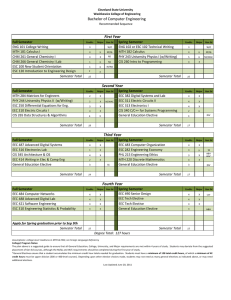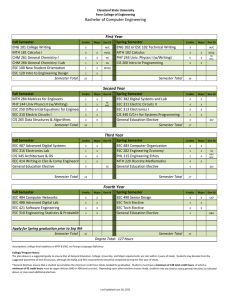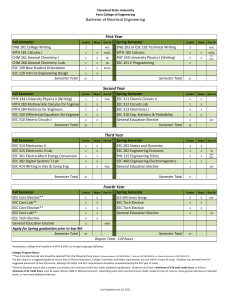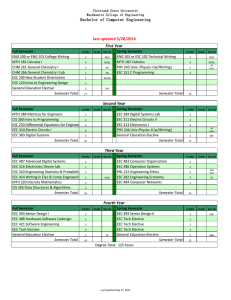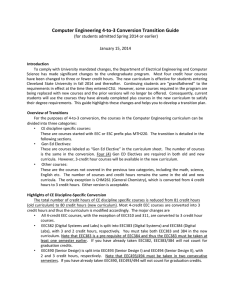Bachelor of Electrical Engineering First Year
advertisement
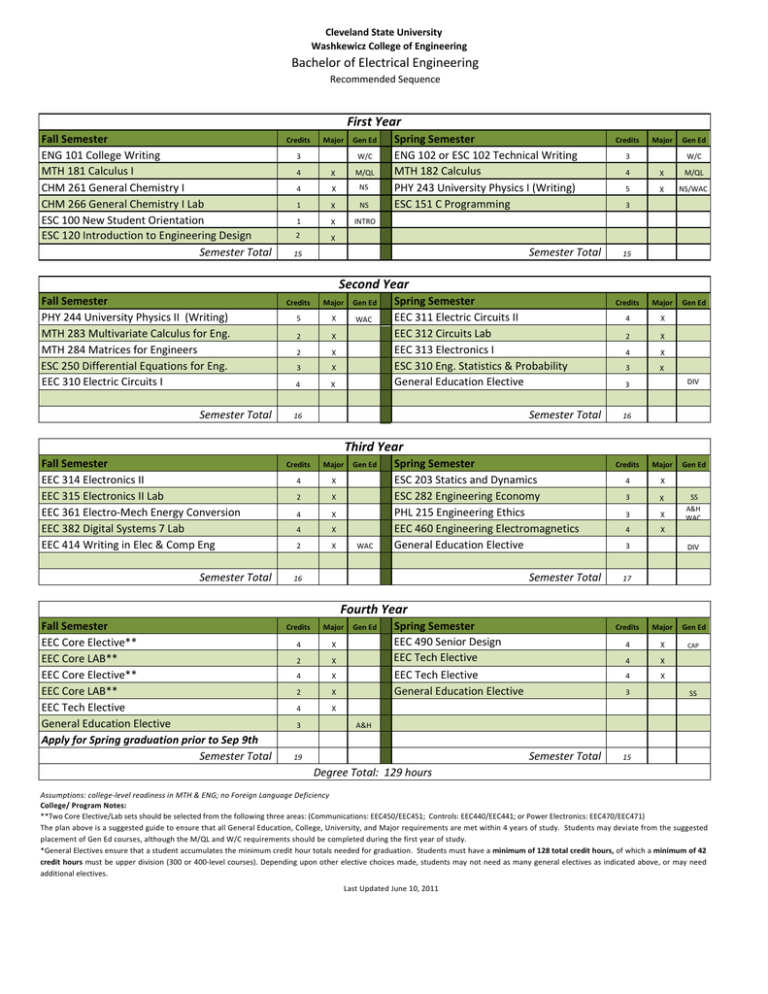
Cleveland State University Washkewicz College of Engineering Bachelor of Electrical Engineering Recommended Sequence First Year Fall Semester ENG 101 College Writing MTH 181 Calculus I CHM 261 General Chemistry I CHM 266 General Chemistry I Lab ESC 100 New Student Orientation ESC 120 Introduction to Engineering Design Semester Total Credits 3 Major Gen Ed W/C 4 X M/QL 4 X NS 1 X NS 1 X 2 15 INTRO X Spring Semester ENG 102 or ESC 102 Technical Writing MTH 182 Calculus PHY 243 University Physics I (Writing) ESC 151 C Programming Credits Major Gen Ed 4 X M/QL 5 X 3 3 Semester Total 15 W/C NS/WAC Second Year Fall Semester PHY 244 University Physics II (Writing) MTH 283 Multivariate Calculus for Eng. MTH 284 Matrices for Engineers ESC 250 Differential Equations for Eng. EEC 310 Electric Circuits I Credits Major 5 X 2 X 2 X 3 X Semester Total 16 WAC 4 Gen Ed X Spring Semester EEC 311 Electric Circuits II EEC 312 Circuits Lab EEC 313 Electronics I ESC 310 Eng. Statistics & Probability General Education Elective Credits Major 4 X 2 X 4 X 3 X 3 Semester Total 16 Gen Ed DIV Third Year Fall Semester EEC 314 Electronics II EEC 315 Electronics II Lab EEC 361 Electro‐Mech Energy Conversion EEC 382 Digital Systems 7 Lab EEC 414 Writing in Elec & Comp Eng Credits Major 4 X 2 X 4 X 4 X 2 Semester Total 16 Gen Ed X WAC Spring Semester ESC 203 Statics and Dynamics ESC 282 Engineering Economy PHL 215 Engineering Ethics EEC 460 Engineering Electromagnetics General Education Elective Credits Major 4 X 3 X SS 3 X A&H WAC 4 X 3 Semester Total 17 Gen Ed DIV Fourth Year Fall Semester EEC Core Elective** EEC Core LAB** EEC Core Elective** EEC Core LAB** EEC Tech Elective General Education Elective Apply for Spring graduation prior to Sep 9th Semester Total Credits Major 4 X 2 X 4 X 2 X 4 X 3 19 Gen Ed A&H Spring Semester EEC 490 Senior Design EEC Tech Elective EEC Tech Elective General Education Elective Credits Major 4 X 4 X 4 X 3 Semester Total 15 Gen Ed CAP SS Degree Total: 129 hours Assumptions: college‐level readiness in MTH & ENG; no Foreign Language Deficiency College/ Program Notes: **Two Core Elective/Lab sets should be selected from the following three areas: (Communications: EEC450/EEC451; Controls: EEC440/EEC441; or Power Electronics: EEC470/EEC471) The plan above is a suggested guide to ensure that all General Education, College, University, and Major requirements are met within 4 years of study. Students may deviate from the suggested placement of Gen Ed courses, although the M/QL and W/C requirements should be completed during the first year of study. *General Electives ensure that a student accumulates the minimum credit hour totals needed for graduation. Students must have a minimum of 128 total credit hours, of which a minimum of 42 credit hours must be upper division (300 or 400‐level courses). Depending upon other elective choices made, students may not need as many general electives as indicated above, or may need additional electives. Last Updated June 10, 2011 Cleveland State University Washkewicz College of Engineering Bachelor of Electrical Engineering Recommended Sequence University Notes: SS = Social Sciences Requirement (2 courses, one of which must be focused outside the US**) Gen Ed Key: A&H = Arts & Humanities Requirement (2 courses, one must be focused outside the US**) INTRO = Introduction to University Life Requirement (one course) W/C = DIV = Social Diversity Requirement (2 courses; one US Diversity and one African American Exp.) Writing/Composition Requirement (two courses; C or better required) M/QL = WAC/SPAC = Writing/Speaking Across the Curriculum Requirement (3 courses, one in the major) Mathematics/Quantitative Literacy Requirement (two courses) NS = Natural CAP = Capstone Requirement Sciences (two courses, one of which must have a lab) ** of the SS and A&H courses focused outside the US, one must be focused on Africa, Latin America, Asia or the Middle East (ALAAME) This information is provided solely for the convenience of the reader, and the University expressly disclaims any liability which may otherwise be incurred. This publication is neither a contract nor an offer to make a contract. While every effort has been made to ensure the accuracy of the information, the University reserves the right to make changes at any time with respect to course offerings, degree requirements, services provided, or any other subject addressed herein.
